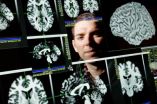(Press-News.org) CHAMPAIGN, Ill. — A new study of 152 Vietnam veterans with combat-related brain injuries offers the first detailed map of the brain regions that contribute to emotional intelligence – the ability to process emotional information and navigate the social world.
The study found significant overlap between general intelligence and emotional intelligence, both in terms of behavior and in the brain. Higher scores on general intelligence tests corresponded significantly with higher performance on measures of emotional intelligence, and many of the same brain regions were found to be important to both. (Watch a video about the research.)
The study appears in the journal Social Cognitive & Affective Neuroscience.
"This was a remarkable group of patients to study, mainly because it allowed us to determine the degree to which damage to specific brain areas was related to impairment in specific aspects of general and emotional intelligence," said study leader Aron K. Barbey, a professor of neuroscience, of psychology and of speech and hearing science at the Beckman Institute for Advanced Science and Technology at the University of Illinois.
A previous study led by Barbey mapped the neural basis of general intelligence by analyzing how specific brain injuries (in a larger sample of Vietnam veterans) impaired performance on tests of fundamental cognitive processes.
In both studies, researchers pooled data from CT scans of participants' brains to produce a collective, three-dimensional map of the cerebral cortex. They divided this composite brain into 3-D units called voxels. They compared the cognitive abilities of patients with damage to a particular voxel or cluster of voxels with those of patients without injuries in those brain regions. This allowed the researchers to identify brain areas essential to specific cognitive abilities, and those that contribute significantly to general intelligence, emotional intelligence, or both.
They found that specific regions in the frontal cortex (behind the forehead) and parietal cortex (top of the brain near the back of the skull) were important to both general and emotional intelligence. The frontal cortex is known to be involved in regulating behavior. It also processes feelings of reward and plays a role in attention, planning and memory. The parietal cortex helps integrate sensory information, and contributes to bodily coordination and language processing.
"Historically, general intelligence has been thought to be distinct from social and emotional intelligence," Barbey said. The most widely used measures of human intelligence focus on tasks such as verbal reasoning or the ability to remember and efficiently manipulate information, he said.
"Intelligence, to a large extent, does depend on basic cognitive abilities, like attention and perception and memory and language," Barbey said. "But it also depends on interacting with other people. We're fundamentally social beings and our understanding not only involves basic cognitive abilities but also involves productively applying those abilities to social situations so that we can navigate the social world and understand others."
The new findings will help scientists and clinicians understand and respond to brain injuries in their patients, Barbey said, but the results also are of broader interest because they illustrate the interdependence of general and emotional intelligence in the healthy mind.
INFORMATION:
(Listen to a podcast of Barbey describing this work.)
The study team also included Roberto Colom, of the Universidad Autónoma de Madrid, and Jordan Grafman, now at the Rehabilitation Institute of Chicago.
This study was conducted in part at the Walter Reed Army Medical Center in Washington, D.C., with support from the National Institute of Neurological Disorders and Stroke at the National Institutes of Health.
Editor's notes: To reach Aron Barbey, call 217-244-2551; email barbey@illinois.edu.
Researchers map emotional intelligence in the brain
2013-01-23
ELSE PRESS RELEASES FROM THIS DATE:
Wood on the seafloor -- an oasis for deep-sea life
2013-01-23
This press release is available in German.Trees do not grow in the deep sea, nevertheless sunken pieces of wood can develop into oases for deep-sea life - at least temporarily until the wood is fully degraded. A team of Max Planck researchers from Germany now showed how sunken wood can develop into attractive habitats for a variety of microorganisms and invertebrates. By using underwater robot technology, they confirmed their hypothesis that animals from hot and cold seeps would be attracted to the wood due to the activity of bacteria, which produce hydrogen sulfide during ...
Vitamin D holds promise in battling a deadly breast cancer, Saint Louis University researchers say
2013-01-23
ST. LOUIS -- In research published in the Jan. 21 issue of The Journal of Cell Biology, a team led by Susana Gonzalo, Ph.D., assistant professor of biochemistry and molecular biology at Saint Louis University, has discovered a molecular pathway that contributes to triple-negative breast cancer, an often deadly and treatment resistant form of cancer that tends to strike younger women. In addition, Gonzalo and her team identified vitamin D and some protease inhibitors as possible new therapies and discovered a set of three biomarkers that can help to identify patients who ...
In the land of the free, interdependence undermines Americans' motivation to act
2013-01-23
Public campaigns that call upon people to think and act interdependently may undermine motivation for many Americans, according to new research published in Psychological Science, a journal of the Association for Psychological Science.
Americans are repeatedly exposed to messages urging them to think and act with others in mind, telling us, for example, to act sustainably by bringing reusable bags to the grocery store or to act responsibly by getting a flu shot. Researchers MarYam Hamedani, Hazel Rose Markus, and Alyssa Fu of Stanford University wondered what impact these ...
First global assessment of land and water 'grabbing' published in national journal
2013-01-23
As world food and energy demands grow, nations and some corporations increasingly are looking to acquire quality agricultural land for food production. Some nations are gaining land by buying up property – and accompanying water resources – in other, generally less wealthy countries.
Sometimes called "land grabbing," this practice can put strains on land and water resources in impoverished countries where the land, and needed water, has been "grabbed" for commercial-scale agriculture.
A new study by the University of Virginia and the Polytechnic University of Milan, ...
USDA studies confirm plant water demands shift with water availability
2013-01-23
WASHINGTON, January 22, 2012—Plants can adapt to extreme shifts in water availability, such as drought and flooding, but their ability to withstand these extreme patterns will be tested by future climate change, according to a study by U.S. Department of Agriculture (USDA) scientists and their cooperators.
The study was published this week in Nature by a team of Agricultural Research Service (ARS) scientists led by Guillermo Ponce Campos and Susan Moran and an Australian team led by Alfredo Huete from the University of Technology, Sydney (UTS). This research included ...
Just add water: How scientists are using silicon to produce hydrogen on demand
2013-01-23
BUFFALO, N.Y. — Super-small particles of silicon react with water to produce hydrogen almost instantaneously, according to University at Buffalo researchers.
In a series of experiments, the scientists created spherical silicon particles about 10 nanometers in diameter. When combined with water, these particles reacted to form silicic acid (a nontoxic byproduct) and hydrogen — a potential source of energy for fuel cells.
The reaction didn't require any light, heat or electricity, and also created hydrogen about 150 times faster than similar reactions using silicon particles ...
People seek high-calorie foods in tough times
2013-01-23
Bad news about the economy could cause you to pack on the pounds, according to a new study published in Psychological Science, a journal of the Association for Psychological Science.
The study shows that when there is a perception of tough times, people tend to seek higher-calorie foods that will keep them satisfied longer. When subconsciously primed with such messages, a "live for today" impulse is triggered causing people to consume nearly 40 percent more food than when compared to a control group primed with neutral words.
"The findings of this study come at a time ...
Genomic sequencing identifies mutant 'drivers' of common brain tumor
2013-01-23
BOSTON—Large-scale genomic sequencing has revealed two DNA mutations that appear to drive about 15 percent of brain tumors known as meningiomas, a finding that could lead to the first effective drug treatments for the tumors, report scientists from Dana-Farber Cancer Institute and the Broad Institute.
Surgery and radiation currently are the only treatments for meningiomas – slow-growing, often benign tumors that develop in the membranes surrounding the brain. Meningiomas can grow dangerously large, however, causing seizures and limb weakness, and occasionally are fatal. ...
Circadian rhythms can be modified for potential treatment of disorders
2013-01-23
Irvine, Calif., Jan. 22, 2013 — UC Irvine-led studies have revealed the cellular mechanism by which circadian rhythms – also known as the body clock – modify energy metabolism and also have identified novel compounds that control this action. The findings point to potential treatments for disorders triggered by circadian rhythm dysfunction, ranging from insomnia and obesity to diabetes and cancer.
UC Irvine's Paolo Sassone-Corsi, one of the world's leading researchers on the genetics of circadian rhythms, led the studies and worked with international groups of scientists. ...
Study: Viral reactivation a likely link between stress and heart disease
2013-01-23
COLUMBUS, Ohio – A new study could provide the link that scientists have been looking for to confirm that reactivation of a latent herpes virus is a cause of some heart problems.
Looking at blood samples from 299 heart patients, researchers at Ohio State University found that those who had suffered a heart attack were the most likely to have inflammatory proteins circulating in their blood compared to patients with less acute symptoms. And having more of one of these proteins in the blood was linked to the presence of antibodies that signal a latent Epstein-Barr virus ...


